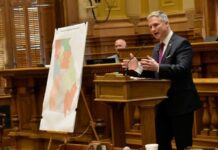
Lawmakers signed off Thursday on a revised $26.3 billion spending plan that dedicated more state money to public health but left in place some budget cuts that were made when the financial outlook was bleak.
The budget easily cleared the House with a 149-to-20 vote and now heads to the Senate, where lawmakers plan to begin meeting early Friday morning. A vote in the Senate could come late next week.
The budget state representatives took up Thursday is a revised version of what was passed in June when dire revenue projections drove lawmakers to cut $2.2 billion from the budget. State revenues beat those dire expectations, partly with the help of massive federal spending.
But uncertainty remains as the pandemic persists a year after the coronavirus first appeared in Georgia and as some long-term ripple effects remain unclear.
Rep. Terry England, who is the top budget writer in the House, said Thursday that the state still has “some headwinds in front of us.” Budget writers are particularly worried about the full cost of refunds after personal income tax withholding was taken out of unemployment benefits.
Democrats have criticized the governor and Republicans for not fully reversing the $950 million cut to public education that was made last summer. More than half of the reduction has been erased. Schools have also received an influx of federal aid during the pandemic.
“Between k-12 education spending, higher education and technical college education spending, we spend well over 50% of the state’s budget on education,” England said. “It is our priority, and to say otherwise is dishonest.”
House Minority Leader James Beverly, who voted against the budget, argued afterward that the rest of the reduction could have been restored by dipping into the state’s $2.7 billion reserves.
“We can close the gap right now by taking a portion of that money to fill the budget cuts that already happened. And we won’t do it,” the Macon Democrat said. “And that’s money that taxpayers have paid for time like this. It is called the revenue shortfall reserve. Why not use it?”
House budget writers did, however, increase the state’s role in funding a public health system that some argue has been underfunded for years. Gov. Brian Kemp’s budget mostly relied on federal aid to fight the virus, prompting criticism and unflattering news coverage.
Most notably, the budget now sets aside $18 million that would go toward replacing and modernizing the state’s overwhelmed Georgia Immunization Registry, or GRITS, that was not built to handle large volumes of vaccination data. About $286,000 was also added to hire a chief medical officer, a deputy commissioner, and a chief data officer with the state Department of Public Health.
“It was our priority to help Georgians. We’re still in a pandemic,” House Speaker David Ralston told reporters Thursday.
“In the last 24 hours, I’ve lost two friends,” the Blue Ridge Republican said, his voice breaking. “Everybody’s losing friends, family members, and so we have to keep that on the front burner. And we did.”
As proposed, this year’s budget would also spend $38.6 million on new school buses for k-12 districts, put $20 million toward rural broadband infrastructure grants, and add extra funds to aid nursing homes that have been ground zero for COVID-19 while also seeing a drop off in patients needing rehabilitation services due to the decline in elective surgeries.
Once the updated budget for this year is buttoned up, Ralston said his chamber would press on with next year’s budget that takes effect July 1. Last spring, the pandemic forced lawmakers to suspend their work and return in June to finish the budget and take up legislation.
Kemp unveiled his $27.2 billion spending proposal for next year earlier this month.
Legislators are hurriedly working to finalize a budget at least through the end of June in case the coronavirus upends the session as it did last year.
But it is not the fastest lawmakers have ever ushered through an amended spending plan. The budget that passed on Feb. 3, 1994, will likely continue to hold that record, according to England.







